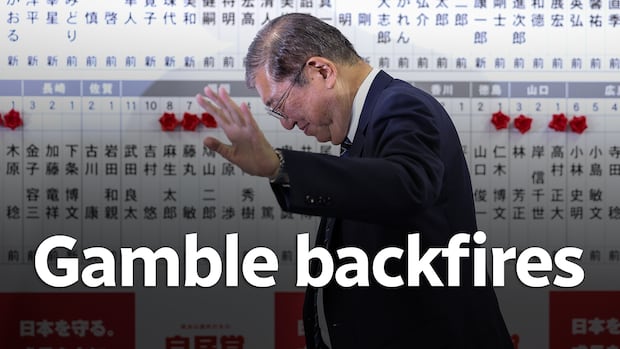
Japan PM Ishiba vows to stay on after party loses majority in upper house election
Published: 2025-07-21 18:15:07 | Views: 16
Japanese Prime Minister Shigeru Ishiba vowed to remain in office on Monday after his ruling coalition suffered a bruising defeat in upper house elections, as the opposition weighed a no-confidence motion.
The embattled premier told a news conference he would remain in office to oversee tariff talks with the United States and other pressing matters such as rising consumer prices that are straining the world's fourth-largest economy.
"While I painfully feel my serious responsibility over the election results, I believe I must also fulfil my responsibility I bear for the country and the people so as not to cause politics to stall or go adrift," Ishiba said. "Challenges such as global situation and natural disaster won't wait for a better political situation."
Facing a voter backlash over rising consumer prices, investors fear his administration will now be more beholden to opposition parties advocating for tax cuts and welfare spending that the world's most indebted country can ill afford.
Ishiba's Liberal Democratic Party (LDP) and coalition partner Komeito returned 47 seats, short of the 50 seats it needed to ensure a majority in the 248-seat upper chamber in an election where half the seats were up for grabs.
The LDP, which has led Japan for most of its postwar history, is still the leading party in both houses of the Diet, the country's national legislature. But the result Sunday follows Ishiba's coalition losing its majority in last October's lower house election, stung by past corruption scandals.
Ishiba said Monday that the LDP and Komeito would remain coalition partners.
Centrist, far-right parties make gains
Some senior LDP lawmakers were also quietly voicing doubts over whether Ishiba should stay, according to local media reports on Monday.
Among them was former prime minister Taro Aso, leader of a powerful faction within the ruling party, who said he "couldn't accept" Ishiba staying on, Japan's TV Asahi reported. Senior party members including Aso met on Sunday evening to discuss whether Ishiba should resign, Sankei newspaper reported.
The leader of the main opposition Constitutional Democratic Party (CDPJ), Yoshihiko Noda, said on Sunday he is considering submitting a vote of non-confidence in the Ishiba administration as the result showed it did not have voters' trust.
The CDPJ returned 22 seats in the ballot, finishing second.
The far-right Sanseito party clocked the biggest gains of the night, adding 14 seats to one elected previously.
Launched on YouTube during the pandemic by spreading conspiracy theories about vaccinations and a cabal of global elites, the party found wider appeal with its "Japanese First" campaign and warnings about a "silent invasion" of foreigners. Dragging once-fringe rhetoric into the mainstream, its success could mark the arrival of populist politics in Japan, which until now has failed to take root as it has in the United States and western Europe.
Sanseito's party leader Sohei Kamiya, a former supermarket manager and English teacher, has previously pointed to Germany's AfD and Reform UK as a possible blueprint for future success.
"The political situation has become fluid and could lead to a leadership change or the reshuffling of the coalition in coming months, but Prime Minister Shigeru Ishiba will likely stay to complete the tariff negotiations with the U.S. for now," said Oxford Economics' lead Japan economist Norihiro Yamaguchi.
Japan's chief tariff negotiator Ryosei Akazawa departed for trade talks in Washington on Monday morning, his eighth visit in three months.
The world's fourth-largest economy faces U.S. tariffs of 25 per cent imposed by the White House, effective Aug. 1, despite talks that initially showed promise. Trump earlier this month hammered Japan over what he said was Tokyo's reluctance to import U.S.-grown rice, and accusing Japan of engaging in "unfair" autos trade. He has also called on Japan to import more U.S. oil. Japan is seeking concessions for its large automobile industry as talks continue with the Trump administration.
Source link






